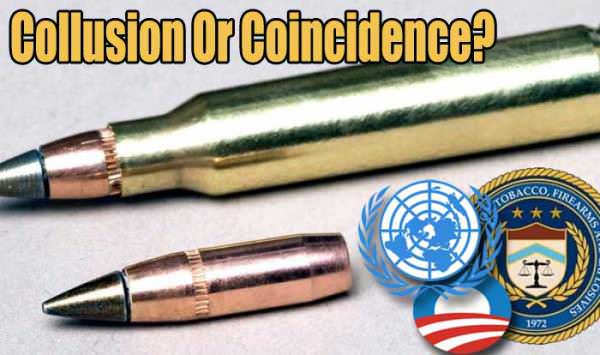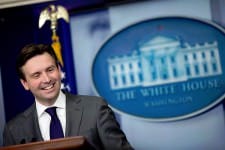The February BATF Ammo Ban Proposal Was Nearly Identical to a January UN Ammo Ban Proposal.
 Collusion Or Coincidence? ATF’s Ammo Ban Identical to UN Ammo Ban
Collusion Or Coincidence? ATF’s Ammo Ban Identical to UN Ammo Ban TSM Worldwide LLC
TSM Worldwide LLCGeneva – -(Ammoland.com)- For much of the past month, the American shooting industry and pro-gun civil arms rights groups, along with the majority of lawmakers on Capitol Hill,[1] have been rightly preoccupied with the Obama Administration’s latest gun control proposal to effectively ban common center-fire ammunition used in popular AR-15 style rifles and pistols.
The resignation of the BATF Director last week should not be the end of the story however…the Senate and House Judiciary Committees should question the acting Director of the BATF, along with other officials at the Departments of State and Justice on the apparent transnational dimension of the aborted ammo ban.
The fact is that the 13 February BATF ammo ban is linked through timing, content, and “covert” or “off the books” US involvement to a nearly identical United Nations plan released for comment to a small group of pre-approved experts on 19 January 2015.[2]
Setting aside the questions raised by the Administration’s January “publishing error” detailing current law as if the proposed ban was adopted months prior when in fact the proposal hadn’t even been made public,[3] the apparent violation of Administrative Procedures Act (APA) (5 U.S.C. 533),[4] and the less than credible justification given by the White House Press Secretary on 2 March,[5],
I submit that new attention needs to be given to the transnational dimension of this latest gun control initiative because of the appearance on its face that the Obama Administration has secretly been offshoring its domestic firearms policymaking to democratically unaccountable officials in the United Nations, for years.
 A smirking White House spokesman Josh Earnest couldn’t conceal his glee when asked about the ammo ban.
A smirking White House spokesman Josh Earnest couldn’t conceal his glee when asked about the ammo ban.Was the recent BATF ammo ban the result of years of secret coordination to get around Capitol Hill lawmakers? Was it all just a coincidence? Why has the US been so silent on the controversial small arms control standards that have been published by the UN over the years? Whatever the truth is, Americans must know more, and should demand two things as a minimum:
- A full accounting of the US involvement in the UN’s International Small Arm Control Standards (ISACS) multi-stakeholder initiative (MSI), and
- A declarative statement of position on the broader model national regulation the UN proposed on 19 January 2015.
The following is a summary of the linkages between the BATF ammo ban and the UN’s nearly identical proposed ammo ban:
- Timing. The BATF’s 13 February proposal[6] to effectively ban certain 5.56mm ammunition was in fact preceded by the UN’s nearly identical proposal on 19 January, which was open for comment to a closed group that included US government officials. TSM Worldwide LLC sent an alert about this UN proposal on 5 February to various media outlets, selected US national lawmakers, and various trade, sporting, and pro-gun civil society organizations.[7]
- Content. The UN’s proposed ban on center-fire armor piercing ammunition starts with a new definition on page 2 that actually adopts the identical two-part definition found in current BATF regulations, minus language for exemptions for sporting purposes and minus any mention of the SS109 and M855 types of 5.56mm ammunition the BATF sought to ban. The UN’s proposed ban picks up on page 4 with an unambiguous categorical ammo ban. This ban was part of a comprehensive 2015 proposed international standard titled “National regulation of civilian access to small arms and light weapons,” which was last proposed in 2011 as model national “legislation” as opposed to “regulation.”[8] The 2011 version was tabled until after the Arms Trade Treaty (ATT) entered into force last December. It should be noted that this standard also specifically states in its Forward that it is intended to elaborate upon the global small arms control framework, of which the ATT is now part. In essence, the standard itself clarifies it is designed to elaborate, among other things, model national implementing regulations, after-the-fact back-door ATT treaty provisions.
- Involvement. The official UN ISACS MSI website does not list any official American involvement in the ISACS MSI.[9] However, the internal UN participation list obtained by TSM Worldwide LLC shows that BATF’s Senior International Affairs Advisor, Mr. Bill Kullman, has been involved for years. The UN’s ISACS MSI participant list shows Mr. Kullman is not alone. Three US Department of State officials have also been been involved: Mr. Paul Shott, Mr. Sho Morimoto, and Mr. Steven Costner.
Finally, I would like to encourage industry and pro-gun civil society groups, along with concerned leaders on Capitol Hill, to urge the Obama Administration to account for its suspicious “off the books” participation in the scandalously defective UN ISACS MSI, and its apparent willingness to hastily operationalize its latest controversial normative output.[10]
 This United Nations Monument Says it All… The sculpture, named Non-Violence, or The Knotted Gun, was designed by Carl Fredrik Reuterswärd, and was given by the government of Luxembourg to the United Nations. Many gun prohibitionists equate non-violence with the absence of firearms, but they may well be be wrong. A world without firearms in the hands of non-state actors (e.g. civilians) would likely be a much more dangerous and violent world, because physically stronger people could attack smaller victims with impunity, and because victims of genocide and oppression would have no practical means of resistance.
This United Nations Monument Says it All… The sculpture, named Non-Violence, or The Knotted Gun, was designed by Carl Fredrik Reuterswärd, and was given by the government of Luxembourg to the United Nations. Many gun prohibitionists equate non-violence with the absence of firearms, but they may well be be wrong. A world without firearms in the hands of non-state actors (e.g. civilians) would likely be a much more dangerous and violent world, because physically stronger people could attack smaller victims with impunity, and because victims of genocide and oppression would have no practical means of resistance.Unless the Obama Administration withdraws completely from or demands a fundamental reset and/or major reform of this UN agency-captured and undemocratic transnational lawmaking effort, the Administration’s continuing secret and silent partnership can only be seen as treacherous complicity in the systematic prejudicing of the interests of the United States, the subordination of the US Constitution and Bill of Rights, and the complete disregard for the rights of the broader shooting industry and the 62% of stake-holding American citizens (198 million voters) who believe having a gun at home makes them safer.[11]
Here are just a few questions raised by the BATF and UN ammo ban proposals:
- Does the BATF and US State Department secretly coordinate to offshore aspects of domestic firearms policy making to the UN’s ISACS MSI?
- If the BATF and US Department of State do not offshore aspects of domestic firearms policy making, what then is the nature of the US participation in the UN ISACS MSI? Why are four US officials listed on the UN’s own internal participant list and none are listed on the UN’s public website?
- Are there really only just four US government representatives involved in the ISACS MSI? If there are more, who are they and what have they been up to?
- What have each of the US officials contributed or communicated to the UN ISACS MSI Coordinator and/or his sponsors over the years?
- Does the US Government work through Canadian, Australian, or other officials abroad to develop international small arms control standards?
- What explains the extremely close timing and sequence of the UN and BATF proposals?
- Does the UN’s Coordinating Activity on Small Arms, the multi-agency sponsor of the UN ISACS MSI, direct or influence the BATF?
- Did the BATF provide the new definition of armor piercing ammunition now seen in the 2015 draft UN standard on national regulation of civil access to small arms?
- Did the BATF wait for the UN to announce its proposed ban as international normative cover for BATF’s domestic policy proposal?
- Why did the BATF propose its ammunition policy change before the UN’s own comment period closed? Was this because the UN’s own comment period is understood to be just for show and/or that this part of the draft won’t actually change?
- As the competent US regulator, why hasn’t the BATF provided any public comments to the UN on any UN draft or approved international standards on small arms control?
- Who in the government, on behalf the citizens of the United States, has been defending America’s national interests by discouraging the development of biased, arbitrary and/or prejudicial international small arms control norms and/or customary international law?
- It is customary in international standards development undertakings to equate silence with consent. Does the silence of the Obama Administration mean that it agrees and supports everything that the UN ISACS MSI has produced?
- What exactly is the official position of the US Government with respect to the UN ISACS MSI?
- What’s the position of the US government on the 2015 draft UN standard detailing model national regulations on civilian access to small arms, standard 3.30 version 3.1?
- Is the UN ISACS MSI a credible international standards development undertaking? Does the UN ISACS have any normative value? Does it create obligations for American actors (US rulemakers, lawmakers, judges, corporations, non-profits, private citizens)?
- The UN ISACS MSI is evidently part of the Arms Trade Treaty (ATT) implementation process. This has been confirmed in the preface of each ISACS published by the UN since the UN General Assembly approved the ATT in 2013. If this is true, and the US Government is barred from spending any money or supporting the domestic implementation of the Arms Trade Treaty, why are at least four US government officials participating in the UN ISACS MSI still? Why hasn’t the US spoken out in opposition to the UN ISACS MSI process and its ouputs. And why is the United States playing host to the UN ISACS MSI Coordinator and his team in New York?
Notes
[1] A majority of lawmakers in both the US House of Representatives and Senate have signed-off on two letters sent to the BATF from of their respective Judiciary Committee Chairs. The letter from the House is here: http://tsmworldwide.com/?p=2307. The letter from the Senate is here: http://tsmworldwide.com/?p=2305.
[2] See Patrick Mc Carthy. ‘Email To ISACS Participants Announcing ISACS 3.3 v. 3.1 Comment Per...‘ 19 January 2015. See also United Nations. ‘Draft International Small Arms Control Standard 3.3 v. 3.1 National... Small Arms and Light Weapons.‘ 2015
[3] BATF. ‘Notice of Publication Error.’ 6 March 2015. Accessed 19 March.
[4] The Administrative Procedures Act (APA) (5 U.S.C. 533) states “general notice of proposed rulemaking shall be published in the Federal Register.” Online: http://www.archives.gov/federal-register/laws/administrative-proced....
[5] Mr. Josh Earnest, the Press Secretary to the President of the United States, suggested on 2 March 2015 that the latest Obama ammo ban priority “was valuable for one reason alone…to protect our brave men and women in law enforcement” from armor piercing ammo. His comments suggest there is data suggesting this policy change is constitutionally narrow and rationally tailored to an actual problem or threat to public safety. The fact is that the so-called threat the Administration is responding is hypothetical as it does not appear the US Government can point to one case where a law enforcement officer has been injured or killed by the ammunition it seeks to ban, let alone an officer killed after the bullets penetrated body armor. See Josh Earnest. White House Press Secretary. ‘Press Briefing on 2 March 2015.’ .
[6] ATF. ‘ATF Framework for Determining Whether Certain Projectiles Are Prima....’ 13 February 2015.
[7] TSM Worldwide LLC. ‘Event Alert on UN ISACS Draft Standard on National Regulation of Ci...‘ 5 February 2015.
[8] United Nations. ‘Draft International Small Arms Standard 3.3 version 3.0 National Co...‘ 2011.
[9] See the UN ISACS MSI website here for a public listing of ISACS partners. http://smallarmsstandards.org/partners.html
[10] For more on the defective aspects of the broader UN ISACS MSI, see Jeff Moran. ‘The American Position: UN International Small Arms Control Standards.’ TSM Worldwide LLC. Updated 12 February 2015. For a collection of reference documents see Online Document Repository: UN International Small Arms Control Sta....’ TSM Worldwide LLC. 23 March 2015.
[11] Justin McCarthy. ‘More Than Six in 10 Americans Say Guns Make Homes Safer.’ Gallup. 7 November 2014.
Distribution Notice
© TSM Worldwide LLC. Online republication and redistribution are authorized when this entire publication (including title, byline, notes, hyper-links, and this distribution note) and linkable URL here are included. See other published international legal items here.
You need to be a member of 12160 Social Network to add comments!
Join 12160 Social Network